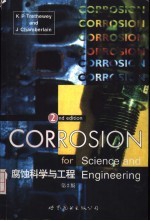图书介绍
Corrosion for Science and Engineering 2nd ed2025|PDF|Epub|mobi|kindle电子书版本百度云盘下载

- K.R.Trethewey &J.Chamberlain 著
- 出版社: 世界图书出版公司北京公司
- ISBN:7506247356
- 出版时间:2000
- 标注页数:466页
- 文件大小:35MB
- 文件页数:480页
- 主题词:
PDF下载
下载说明
Corrosion for Science and Engineering 2nd edPDF格式电子书版下载
下载的文件为RAR压缩包。需要使用解压软件进行解压得到PDF格式图书。建议使用BT下载工具Free Download Manager进行下载,简称FDM(免费,没有广告,支持多平台)。本站资源全部打包为BT种子。所以需要使用专业的BT下载软件进行下载。如BitComet qBittorrent uTorrent等BT下载工具。迅雷目前由于本站不是热门资源。不推荐使用!后期资源热门了。安装了迅雷也可以迅雷进行下载!
(文件页数 要大于 标注页数,上中下等多册电子书除外)
注意:本站所有压缩包均有解压码: 点击下载压缩包解压工具
图书目录
1 Corrosion and society1
1.1 The lessons of history1
1.2 The expense of corrosion5
1.3 Social implications of corrosion8
1.4 Corrosion and the environment17
1.5 Concluding remarks19
1.6 References19
1.7 Bibliography21
2 Enabling theory for aqueous corrosion23
2.1 Energy: the rule of law23
2.2 Matters of substance26
2.3 Processes in solution31
2.4 Metals: might and blight34
2.5 Metals in the melting pot35
2.6 Defects in metal structures37
2.7 Electrical science39
2.8 Glossary44
2.9 Worked examples45
2.10 Problems47
2.11 Bibliography48
3 Practical aqueous corrosion49
3.1 Common apparatus49
3.2 The experiments51
3.3 Discussion65
4 The theory of aqueous corrosion69
4.1 Thermodynamics of corrosion reactions71
4.2 The basic wet corrosion cell75
4.3 Standard electrode potentials81
4.4 Reference electrodes85
4.5 Cell potential87
4.6 Kinetics of corrosion reactions91
4.7 Polarisation95
4.8 Diffusion processes and the double layer100
4.9 Mixed potential theory102
4.10 Pourbaix diagrams106
4.11 Three-electrode cells and E/lg i plots111
4.12 Polarisation curves120
4.13 Electrochemical impedance124
4.14 References128
4.15 Bibliography129
5 Dissimilar metal corrosion130
5.1 The galvanic series135
5.2 Corrosion quantification139
5.3 References143
5.4 Bibliography143
6 Selective attack144
6.1 Grain boundary corrosion145
6.2 Intergranular corrosion147
6.3 Selective leaching151
6.4 Microbiologically induced corrosion156
6.5 References160
6.6 Bibliography160
7 Crevice and pitting corrosion: concentration cells162
7.1 The mechanism of crevice corrosion165
7.2 Pitting corrosion168
7.3 Differential-aeration corrosion169
7.4 Electrochemical techniques173
7.5 Material susceptibility186
7.6 References187
7.7 Bibliography190
8 Flow-induced corrosion191
8.1 Fluid flow191
8.2 Cavitation196
8.3 Bibliography197
9 Enabling theory for environment-sensitive cracking199
9.1 Elasticity: stress and strain199
9.2 The tensile test201
9.3 Stress concentration203
9.4 Linear elastic fracture mechanics205
9.5 Fatigue209
9.6 Bibliography213
10 Environment-sensitive cracking214
10.1 Stress-corrosion cracking218
10.2 Environment-sensitive cracking: initiation221
10.3 Environment-sensitive cracking: propagation223
10.4 Environment-sensitive cracking: practical aspects228
10.5 Corrosion fatigue231
10.6 References237
10.7 Bibliography239
11 Corrosion management240
11.1 Corrosion control242
11.2 Primary and secondary corrosion mechanisms243
11.3 The people factor248
11.4 Knowledge-based systems251
11.5 Concluding remarks254
11.6 References254
11.7 Bibliography255
12 Corrosion control by design256
12.1 How long do I expect it to last?257
12.2 The ever-changing environment259
12.3 Minimise bimetallic corrosion cells261
12.4 Avoid differential-aeration cells264
12.5 Tanks and pipe systems270
12.6 Stray current corrosion273
12.7 References277
12.8 Bibliography278
13 Corrosion control by environmental change279
13.1 Atmospheric corrosion280
13.2 Control of atmospheric corrosion282
13.3 Modification of the electrolyte286
13.4 Control of aqueous environments294
13.5 Soil as an environment299
13.6 References300
13.7 Bibliography301
14 Corrosion control by coatings302
14.1 Paint systems304
14.2 Paint characteristics306
14.3 Paint types308
14.4 Paint failure319
14.5 Painting costs322
14.6 Plastic coatings323
14.7 Concrete coatings325
14.8 Metallic coatings327
14.9 Methods of metallic coating328
14.10 Behaviour of metallic coatings329
14.11 References335
14.12 Bibliography335
15 Corrosion properties of some metallic materials336
15.1 Plain carbon and low alloy steels338
15.2 Stainless steels341
15.3 Cast irons347
15.4 Aluminium and its alloys348
15.5 Copper and its alloys351
15.6 Titanium356
15.7 Nickel and its alloys361
15.8 Applications in water systems364
15.9 Selection of materials371
15.10 References373
15.11 Bibliography373
16 Cathodic and anodic protection375
16.1 Theoretical basis375
16.2 Sacrificial anode design380
16.3 Sacrificial anode applications387
16.4 Impressed current protection393
16.5 Impressed current applications395
16.6 Anodic protection403
16.7 References404
16.8 Bibliography405
17 Corrosion at elevated temperatures406
17.1 Metal oxides408
17.2 Breakaway corrosion413
17.3 Growth of oxide films416
17.4 Oxidation of alloys419
17.5 Hot corrosion423
17.6 References426
17.7 Bibliography426
18 Worked examples and problems427
18.1 Worked examples427
18.2 Problems433
index457
热门推荐
- 1374139.html
- 3309165.html
- 78348.html
- 1035153.html
- 1928287.html
- 3714233.html
- 3577950.html
- 19860.html
- 3832214.html
- 1017968.html
- http://www.ickdjs.cc/book_1008039.html
- http://www.ickdjs.cc/book_833498.html
- http://www.ickdjs.cc/book_389557.html
- http://www.ickdjs.cc/book_1797536.html
- http://www.ickdjs.cc/book_1051537.html
- http://www.ickdjs.cc/book_3559759.html
- http://www.ickdjs.cc/book_3764213.html
- http://www.ickdjs.cc/book_3143323.html
- http://www.ickdjs.cc/book_2899233.html
- http://www.ickdjs.cc/book_1877668.html